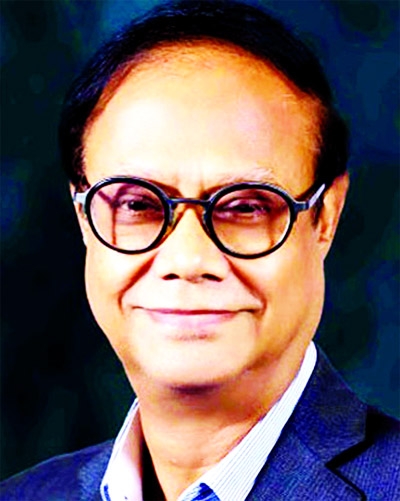
News Desk :
The government faces an uphill task in meeting its revenue collection target while maintaining a positive growth trajectory and containing inflationary pressure in the upcoming fiscal year, according to prominent economist Dr Ahsan H Mansur.
Finance Minister AHM Mustafa tabled a Tk 6.78 trillion national budget on Thursday with the aim of navigating the lagging effects of the coronavirus pandemic and the conflict in Ukraine, reports bdnews24.com
The lofty spending plan comes at a time when the global economy is mired in uncertainty and instability. “As a result, there are no definitive answers in this budget,” said Mansur, director of the Policy Research Institute.
The government will have to monitor developments and take action partway through the year, according to him.
“The budget is a routine one. But then, all budgets have an element of routineness to them. The government will not be able to increase its spending this year. Tax revenue is not increasing and the target previously set for the year will likely not be met.
“According to the government’s budget, the NBR was to take in Tk 3,3 trillion in tax revenue this year, but we believe it will fall short by at least Tk 400 billion. The difference might be even greater.”
Finance Minister Kamal set a target of Tk 3.89 trillion in tax revenue for FY23, a 12 percent increase from the previous year and about 54.56 percent of the total budget.
“The government has presented a restrained budget in light of the circumstances. There is a huge deficit in foreign trade, the pressure on our foreign reserves is rising. Inflation will hit hard. The government has been prudent with the size of the budget. The budget should not be expansive, but constrictive if they aim to drive down import demand and spending.”
The biggest challenge will be raising tax revenue, he said.
“If we look at the growth in tax revenue in the past 10 years, it has hovered between 13 to 16 percent. It has never risen further than that. It is the same this year. Even though the government took in a lot in import duties, the overall rise is only 15-16 percent.”
If the NBR falls short of its revenue target by about Tk 400 billion this year, it will have to increase revenues by about Tk 800,000 to hit the proposed target next year. This means an increase of about 30 percent.
“The NBR has never managed tax revenue growth of 30 percent. Next year, when the economy will be under pressure, while government spending is restricted, and the common people are discouraged from spending, we won’t see such a big jump.”
The researcher also expressed his scepticism about the government’s lofty GDP growth target of 7.5 percent.
“From China to the US, the European Union, and Japan – everyone is trending towards recession. There will be less demand for exports and we will feel the pinch in other ways. We won’t be able to maintain such rapid growth. Meanwhile, the government has been conservative with spending, the ADP and investment, so there isn’t a large stimulus coming, either.”
“Our goal should be bringing stability to the economy. We must reduce import growth to reasonable levels. We must also rein in inflation.”
Inflation in Bangladesh is not out of step with the skyrocketing prices around the world, he said.
“We must reduce inflationary pressure. Firm control must be maintained through a tight monetary policy and tight fiscal policy. Demand must be reduced. The exchange rate must be stabilised. Otherwise, we will be unable to control prices.”
The budget presented by the government for fiscal year 2022-23 fiscal year is not favourable to the common people, but instead, caters to the affluent section of the population, according to the Centre for Policy Dialogue.
In its reaction to the proposed budget on Thursday, the think-tank highlighted several ‘flaws’ in the draft spending plan.
“We proposed that taxes be lifted from various necessities, but little was done. It isn’t enough,” said Dr Fahmida Khatun, the CPD’s executive director.
“Only the tax on wheat was waived – we proposed a waiver on several necessities, including rice.”
The people who were already well-off received even more consideration in the budget, according to her.
“For example, the tax-free limit on travel, rent, and healthcare was raised from Tk 550,000 to Tk 1 million.”
“This wasn’t done for the benefit of the poor.”
The finance minister suggested that gas and power prices will be adjusted gradually, which means it will increase and put more pressure on the common people, Dr Khatun said.
“Less money has been allocated to social security this time. It is even lower than the revised budget in the current fiscal year… this was not done for the benefit of the middle class and the lower middle class who are so essential to development and growth.”
The amnesty on offer to bring back money pilfered abroad was another issue flagged by the researcher.
“First, we make it possible to send it abroad, out of our economy, and then we give tax incentives so they bring back those undisclosed offshore assets. It is immoral.”
Even the decision to cut the corporate tax rate, which might benefit the private sector, also aids those well off, according to her.
In the face of rising inflationary pressure, compounded by the uncertainty in the global economy, the steps outlined in the budget are ‘inadequate’ and the policy guidelines ‘incomplete’ to meet the current challenges faced by the country, Dr Khatun added.
The CPD did, however, laud the government’s decision to increase subsidies in the agriculture sector and acknowledged the difficulties of presenting a budget at this turbulent time.

